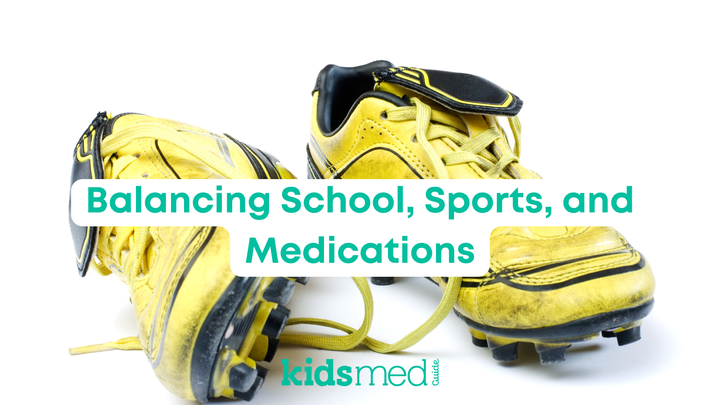Ibuprofen Use in Kids: A Guide for Parents

Ibuprofen is a helpful medication for adults and for kids, too! It's effective and generally considered safe. In addition to acetaminophen, I consider ibuprofen a staple in your arsenal against sickness.
It's a common over-the-counter medication that can help manage pain and reduce fever in children. Knowing how and when to use ibuprofen will help you on those yucky sick days. This blog will provide information on using ibuprofen safely and effectively for your child so you can help them feel better faster.
What is Ibuprofen?
Ibuprofen belongs to a class of medications called nonsteroidal anti-inflammatory drugs (NSAIDs). It works by reducing inflammation and blocking pain signals in the body. It also reduces fever.
Ibuprofen is also known by the trade names Motrin®, Aleve®, or Advil®. Pro tip: Be cautious when buying a brand-name product for your child. Make sure the active ingredient is ibuprofen, not aspirin! Kids can't have aspirin, but unfortunately, drug manufacturers sometimes label different ingredients under their recognized trade names.
For children and teens, ibuprofen is commonly used to treat:
- Fever
- Headaches
- Toothaches
- Earaches
- Minor injuries
- Swelling or inflammation
- Menstrual cramps
It's also common for doctors to recommend alternating between ibuprofen and acetaminophen for stubborn fevers or nasty flu and viruses.
Ibuprofen Dosage and Administration
The correct dosage of ibuprofen for children depends on their weight and age. Always follow the instructions on the product label or your healthcare provider's recommendations.
Ibuprofen is available in tablets, capsules, and oral liquid. The oral liquid is commonly used for children and comes in various colors and flavors, including dye-free and sugar-free options.
Ibuprofen is also found in many combinations of cold and flu, and pain products. Always use caution and read the package labels before giving any over-the-counter medicine to your child.
A special note of caution: multiple concentrations of ibuprofen liquid are available!
Two different concentrations of ibuprofen liquid are available: infant drops and children's liquid. These two products have different milligram (mg) amounts per milliliter (mL), meaning that the same volume of liquid would give you a different dose if you used the two different products.
- Children's liquid: 100 mg / 5 mL (this is equal to 20 mg per 1 mL)
- Infant's liquid: 50 mg / 1.25 mL (this is equal to 40 mg per 1 mL)
Always read the bottle label in hand to be sure you're giving the right amount.
5 mL of the children's liquid is NOT equal to 5 mL of the infant drops. I advise folks never to keep two different strengths in their home simultaneously. It's a mix-up waiting to happen!
Ibuprofen can be given every 6 to 8 hours as needed, but no more than four doses in 24 hours.
Do not use ibuprofen in babies under 6 months of age unless otherwise instructed by your physician.
Important Considerations:
- Use the measuring device provided with the medication for accurate dosing.
- Oral syringes with markings in milliliters or mL are best.
- Ask your pharmacist for extra oral syringes.
- Never use a kitchen spoon or other household measuring device, which can lead to inaccurate dosing.
- Ibuprofen can be given with or without food, but giving it with food may help prevent stomach upset. I time ibuprofen doses for meals.
Safety Precautions
While ibuprofen is generally safe when used as directed, there are some important precautions to keep in mind:
Age Restrictions: Ibuprofen is not recommended for infants under 6 months old without consulting a healthcare provider.
Existing Health Conditions: Consult your child's doctor before using ibuprofen if your child has:
- Asthma
- Bleeding disorders
- Stomach problems
- Kidney disease
- Heart disease
Allergies: Do not give ibuprofen to a child allergic to NSAIDs or allergic to ibuprofen.
Interactions: Ibuprofen can interact with certain medications. Inform your child's doctor about all medicines, vitamins, and supplements your child takes, and double-check with your pharmacist, too!
Potential Side Effects
While most children tolerate ibuprofen well, some may experience side effects. Common side effects include:
- Upset stomach
- Nausea
- Diarrhea
- Dizziness
Serious side effects are rare but can include:
- Allergic reactions (rash, itching, swelling)
- Stomach bleeding
- Kidney problems
If you notice any unusual symptoms or side effects, discontinue use and contact your child's healthcare provider immediately. Any allergic reaction that causes trouble breathing or swelling is a medical emergency.
When to Seek Medical Attention
While ibuprofen can be effective for many common childhood illnesses, there are situations where you should seek medical attention:
- Fever lasting more than 3 days
- Severe pain or pain that persists for more than 10 days
- Symptoms worsening or new symptoms appearing
- Signs of an allergic reaction
- Severe stomach pain or vomiting
Tips for Safe Use
To ensure the safe and effective use of ibuprofen:
- Read the label carefully: Always check the concentration and follow the package's dosing instructions.
- Use the correct formulation: Choose the appropriate product for your child's age (infant drops, children's liquid, chewable tablets, etc.).
- If using a liquid, shake the product well before administration.
- Don't exceed recommended doses: Giving more than recommended can lead to serious side effects.
- Keep Track of Symptoms and Doses: Note the time and amount of each dose to avoid accidental overdose. I like to write down the times that my children receive a dose of medication. It is easy to forget when you are tired or sick! Try our medication tracker to stay organized.
- Store safely: Keep all medications out of reach of children and in their original containers. Place the medicine in a locked, childproof box and store it in a place inaccessible to children.
- Check expiration dates: Don't use expired medication.
- Avoid long-term use: Unless directed by a healthcare provider, ibuprofen should not be used for extended periods. If your child needs ibuprofen for longer than a few days, contact your physician for guidance.
Alternatives to Ibuprofen
Sometimes, ibuprofen is helpful, especially in cases of inflammation. However, parents may want to limit use or avoid the medication altogether. Other things to consider?
- Acetaminophen: Another over-the-counter pain reliever and fever reducer that works differently from ibuprofen. See our blog post about alternating between acetaminophen and ibuprofen.
- Non-medication approaches: For mild discomfort, consider rest, cool compresses, or other comfort measures. Remember the acronym RICE? Rest, ice, compression, and elevation may work for the first day after a mild to moderate injury.
Always consult your child's healthcare provider to determine the best treatment approach for your child's specific situation. Pediatricians should evaluate children with persistent fever or moderate to severe pain.
Conclusion
When used appropriately, ibuprofen can be a safe and effective medication for managing pain and fever in children. By following dosing instructions, being aware of potential risks and side effects, and knowing when to seek medical attention, you can help ensure your child's comfort and well-being.
References
- U.S. National Library of Medicine. (2024). Ibuprofen. DailyMed. https://dailymed.nlm.nih.gov/dailymed/lookup.cfm?setid=faebc392-0fd9-4c71-8471-beba10dda022
- American Academy of Pediatrics. (2023). Ibuprofen dosage table for fever and pain. HealthyChildren.org. https://www.healthychildren.org/English/safety-prevention/at-home/medication-safety/Pages/Ibuprofen-for-Fever-and-Pain.aspx



